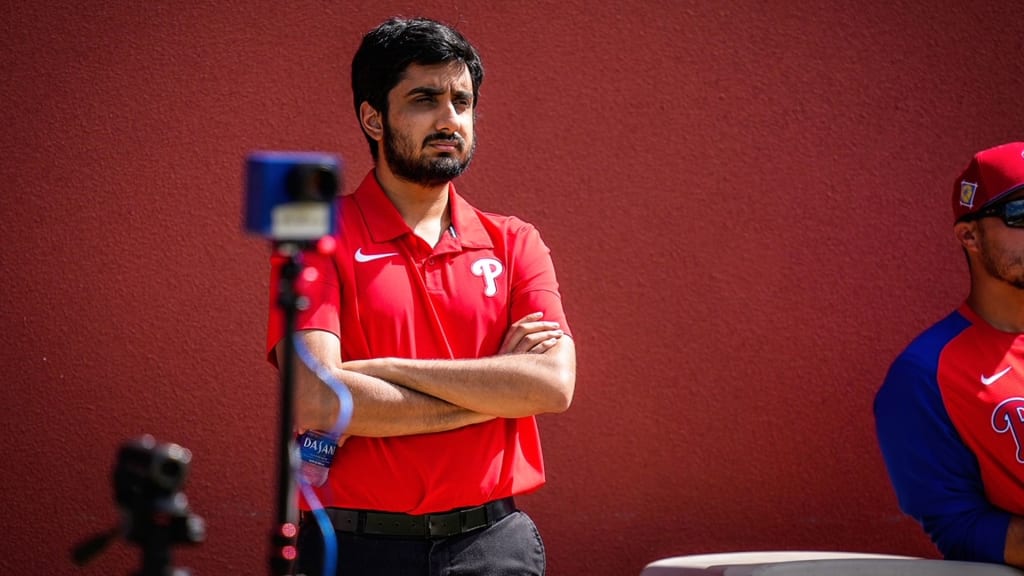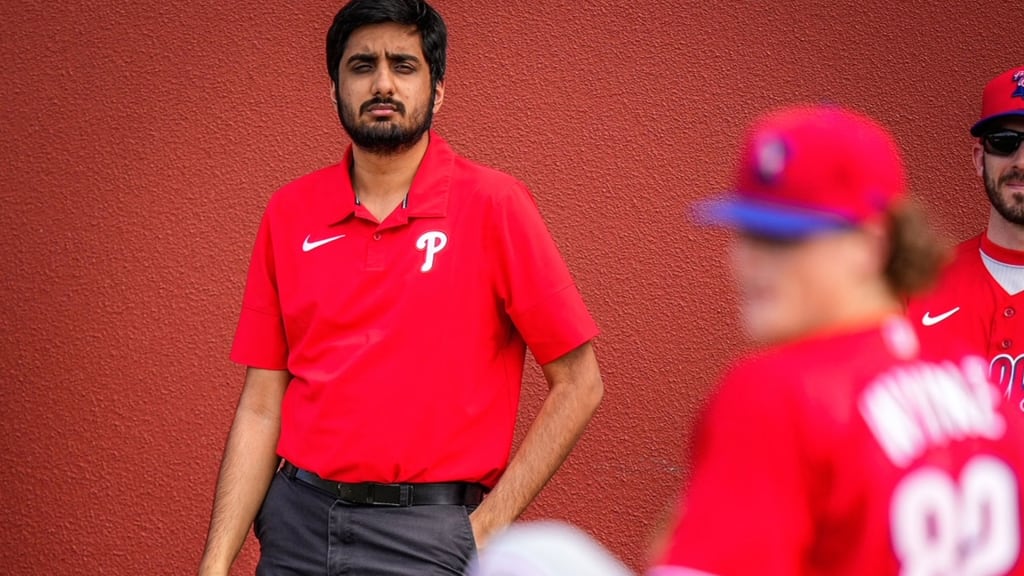
CLEARWATER, Fla. -- Ani Kilambi grew up just a couple of miles from Apple’s main campus in Cupertino, Calif.
Life in Silicon Valley shaped the way he viewed the world and imagined his future. How could it not? There is a tech and entrepreneurial spirit there. It pervades the way people think. Folks in Cupertino have a passion for excellence. There always seems to be somebody doing something cool and innovative around the corner.
But Kilambi had other influences, too. He had baseball. He often attended Giants and A’s games with his family and friends.
“Jason Schmidt was probably my favorite player,” Kilambi said Friday morning at BayCare Ballpark. “I don’t know that there’s any specific reason why. It was just an appreciation for his stuff, his ability to generate swing-and-miss on the changeup. I wouldn’t necessarily have framed it that way as a kid, but that’s sort of how I think about it now.”
The Phillies hired Kilambi, 28, in November to be an assistant general manager in charge of the club’s research departments and the club’s use of data throughout the organization. It was a noteworthy hire. Kilambi spent the past seven seasons with the Rays, who are the envy of nearly every organization for their ability to build championship-caliber rosters on shoestring budgets because of an exceptional research and development department. Rays executives often cited Kilambi last season as they churned through waves of relief pitchers to build a formidable bullpen on their way to the AL pennant.
Somehow, Tampa Bay kept finding quality pitchers who nobody else wanted.
“Frankly, I think it would be unfair or unreasonable for me to take anything close to a large chunk of credit,” Kilambi said.
“He may be underplaying the reputation that he had around the industry,” Phillies general manager Sam Fuld said.

The Phillies have not enjoyed as much such success unearthing hidden gems like the Rays, despite millions of dollars invested in research and development in recent years. It is why Phillies fans were elated at Kilambi’s arrival, even though they almost certainly never heard of him before.
This guy is going to bring Tampa Bay’s magic formula to Philly.
“I was definitely aware of the reaction,” Kilambi said with a laugh. “It is amusing. I wouldn’t say there’s necessarily one magic formula. I think it’s more a question of quickly and confidently identifying players. And then moving just as quickly and just as confidently to acquire them and to develop them and to lean into players’ strengths. I wouldn’t necessarily say that it’s a one-size-fits-all approach, which is why I think the magic formula description falls short. I think it’s really important to be individualized in order to be successful in both player evaluation and development.”
There was another notable reaction to Kilambi’s hiring. He is a first-generation Indian American, so it was a celebratory moment for many who once only dreamed about serving in a role so prominent in a baseball front office.
“It’s tremendous,” Kilambi said. “There was a comment that Farhan Zaidi made a while ago. This is sort of a broader point about diversity, but I think it’s pretty unlikely that every baseball executive looks the same, talks the same and comes from the same background. Over time, I think we’ll see that come to bare in a lot of different ways. I’m really excited to be just one small part of that, and I hope to see more of that in the future.”
Kilambi graduated from UC-Berkeley with a double major in statistics and operations research and management science. He initially thought about a career in finance or business, but he realized that life did not appeal to him.
Baseball did.
“I spent a lot of my time thinking about baseball and working on baseball problems,” he said. “Statistics and operations research were naturally related to my interest in baseball. I really enjoyed spending time learning about how to predict baseball performance. I think that was a passion project of mine.”
He got an internship in the Rays’ research and development department in 2015. He remained in the organization, earning promotions along the way until the Phillies called.
“Learning a little bit more about the Rays and how they operated internally really put me into gear to be more excited about really thinking about optimizing baseball team decision making,” he said. “That’s my goal. It’s to help us make the best decisions baseball, and where that passion came from was being able to observe the Rays process, as an intern, as an entry-level full-time employee. And really understand what the pain points are, how we incorporate information from different departments. I got really excited about it, and that’s really what I’m passionate about -- making the best decisions possible and putting the best team on the field as possible. I’m happy to do that any way possible, if it’s building the statistical models or just helping to bring together information from different departments.”
It essentially means scouting and R&D evaluating players better together, or player development and R&D developing players better together.
“We need all of our oars working in the same direction,” he said. “It isn’t two siloed sources of information. I think that’s something that I can help with, just making sure that we’re focused on the common goal.”
